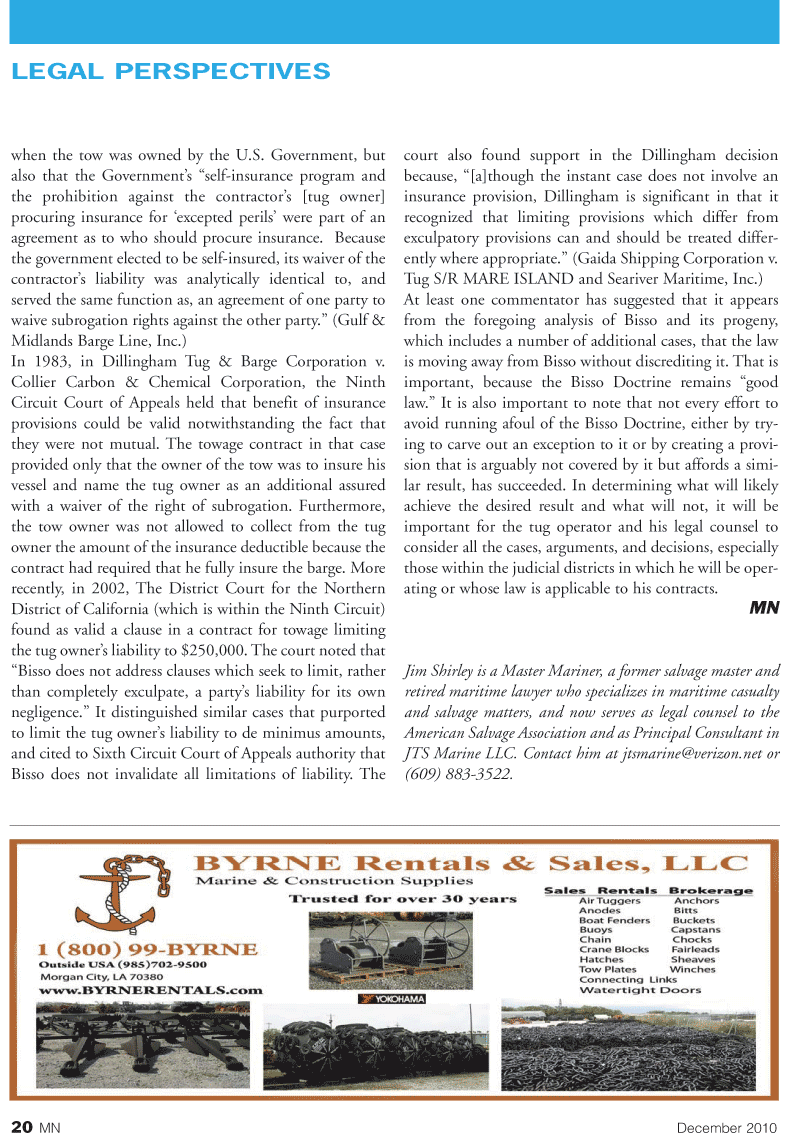
Page 20: of Marine News Magazine (December 2010)
Great Ships of 2010
Read this page in Pdf, Flash or Html5 edition of December 2010 Marine News Magazine
20 MN December 2010 when the tow was owned by the U.S. Government, but also that the Government’s “self-insurance program and the prohibition against the contractor’s [tug owner] procuring insurance for ‘excepted perils’ were part of an agreement as to who should procure insurance. Because the government elected to be self-insured, its waiver of the contractor’s liability was analytically identical to, and served the same function as, an agreement of one party to waive subrogation rights against the other party.” (Gulf &
Midlands Barge Line, Inc.)
In 1983, in Dillingham Tug & Barge Corporation v.
Collier Carbon & Chemical Corporation, the Ninth
Circuit Court of Appeals held that benefit of insurance provisions could be valid notwithstanding the fact that they were not mutual. The towage contract in that case provided only that the owner of the tow was to insure his vessel and name the tug owner as an additional assured with a waiver of the right of subrogation. Furthermore, the tow owner was not allowed to collect from the tug owner the amount of the insurance deductible because the contract had required that he fully insure the barge. More recently, in 2002, The District Court for the Northern
District of California (which is within the Ninth Circuit) found as valid a clause in a contract for towage limiting the tug owner’s liability to $250,000. The court noted that “Bisso does not address clauses which seek to limit, rather than completely exculpate, a party’s liability for its own negligence.” It distinguished similar cases that purported to limit the tug owner’s liability to de minimus amounts, and cited to Sixth Circuit Court of Appeals authority that
Bisso does not invalidate all limitations of liability. The court also found support in the Dillingham decision because, “[a]though the instant case does not involve an insurance provision, Dillingham is significant in that it recognized that limiting provisions which differ from exculpatory provisions can and should be treated differ- ently where appropriate.” (Gaida Shipping Corporation v.
Tug S/R MARE ISLAND and Seariver Maritime, Inc.)
At least one commentator has suggested that it appears from the foregoing analysis of Bisso and its progeny, which includes a number of additional cases, that the law is moving away from Bisso without discrediting it. That is important, because the Bisso Doctrine remains “good law.” It is also important to note that not every effort to avoid running afoul of the Bisso Doctrine, either by try- ing to carve out an exception to it or by creating a provi- sion that is arguably not covered by it but affords a simi- lar result, has succeeded. In determining what will likely achieve the desired result and what will not, it will be important for the tug operator and his legal counsel to consider all the cases, arguments, and decisions, especially those within the judicial districts in which he will be oper- ating or whose law is applicable to his contracts.
MN
Jim Shirley is a Master Mariner, a former salvage master and retired maritime lawyer who specializes in maritime casualty and salvage matters, and now serves as legal counsel to the
American Salvage Association and as Principal Consultant in
JTS Marine LLC. Contact him at [email protected] or (609) 883-3522.
LEGAL PERSPECTIVES

 19
19

 21
21
